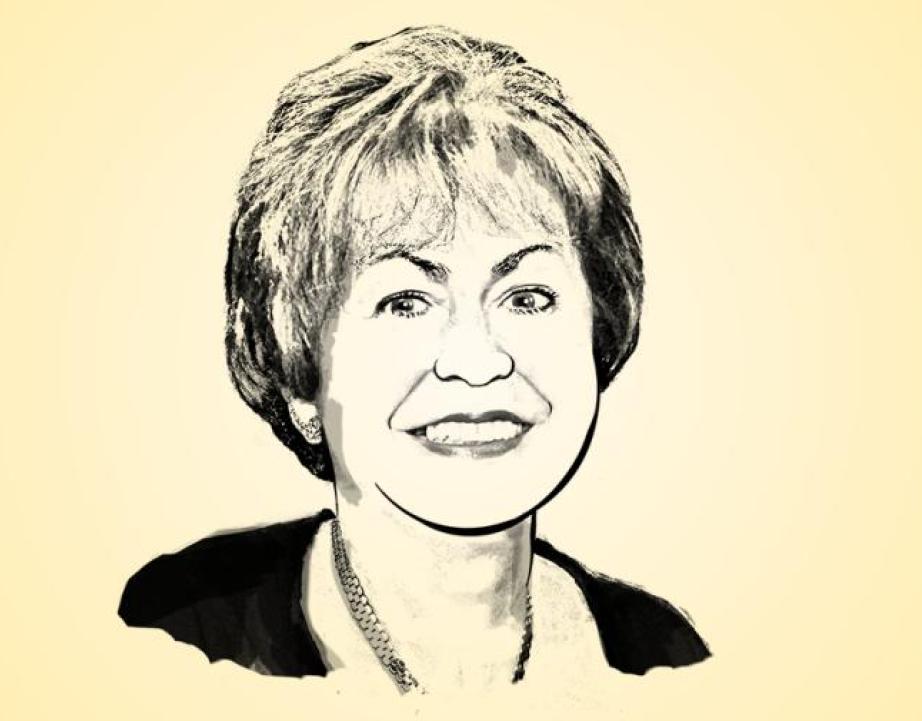by Adam Grybowski
Linda Forgosh ’65 has written the only biography of department store magnate Louis Bamberger
Linda Forgosh ’65 has written several books, but none have received the level of attention as Louis Bamberger: Department Store Innovator and Philanthropist, her new biography of the master merchant who built his department store in Newark, N.J., into one of the largest in the country.
Accolades have poured in since the book’s release in September 2016, including from no one less than Philip Roth, who grew up in Newark and portrayed the city’s history in several of his novels. The letter he wrote to Forgosh in praise of her achievement quickly became one of her most important treasures.
Forgosh, who has been the executive director and curator of the Jewish Historical Society of New Jersey since 1999, realized that while Bamberger was a leading figure in the Garden State and beyond, he remained underappreciated, with no large-scale historical work on his life and legacy. She spent eight years researching and writing the book exclusively on her own time, including vacations. The task was made harder because Bamberger left no business records, personal diaries or other correspondence to document his accomplishments. She traveled as far as Oakland, Calif., to interview people connected to his life.
“Wherever I could find a lead to a Bamberger, I tracked it down,” she says. “I am happy doing research like nobody’s business. I like to know how it ticks, how it came about and how one thing leads to another.”
The alacrity with which she approached the Bamberger project would be familiar to her Rider professors. As a student, her favorite place in Lawrenceville was Moore Library. “The best years of my life were spent at Rider,” Forgosh says. “I had a sense of independence. I loved studying and wanted to be the best student I could be. I always thought it’s better to be a big fish in a little pond, and Rider was a small school and had everything I could ever want.”
Forgosh graduated with two bachelor’s and followed that up with a master’s from Seton Hall. She says her biography of Bamberger was written in lieu of a doctoral dissertation she never pursued as a result of work and family. While successful, her three previous books, which focused on Jewish history in New Jersey, lack the scope of her Bamberger study. The sheer amount of information Forgosh gathered, and the time she spent making sense of it, brought her closer to Bamberger than many people she knows in day-to-day life.
“If you’re ever going to tackle something like a biography, you’d better be darn well prepared to spend time with that person,” she says. “After eight years I felt like I was married to Bamberger and, when the hoopla dies down, I’m finally going to get an amicable divorce.”
Q&A
What is Louis Bamberger’s legacy?
Newark historian Charles Cummings aptly describes him as “the personification of the liberal American businessman, who by his strength of character and idealism secured the faith of the American people in private enterprise.” His department store was one of the great success stories in American business, but it wasn’t the memories of shopping or working at his store that stand out; it is rather his legacy of philanthropy (Beth Israel Hospital, Newark Museum, the YM-YWHA in Newark, Community Chest, Jewish Children’s Home and Institute for Advanced Study, to name a few) and great acts of kindness that made him the giant that he was.
Do you have any personal memories of visiting Bamberger’s?
I have family members who worked and shopped at Bamberger’s. I only recall that my mother took me to Bamberger’s to purchase the dress I wore for my Bat Mitzvah, but that was the one and only time as their prices didn’t fit her pocketbook.
For a figure who had such an impact, why was a major biography so overdue?
Bamberger was unique. He preferred to remain out of the public eye. He rarely gave interviews to reporters and when he did appear in public it was usually to raise funds for worthy causes. He was not one to accept public accolades. In fact, you would be hard pressed to find his name on any of the institutions he founded and funded that, unless you were prepared to do serious research, would never know that he was the primary donor. He complicated things for historians to write about him as he left no business records or personal diaries to explain many of his business decisions. His position that "no one will care what I say, they will only recall what I do" was regrettable for any historian wanting to write about his influence, here in New Jersey and beyond.
What biographies inspire you?
I am interested in biographies about individuals who influenced the course of American history. I have read everything written by David McCullough, Stephen Ambrose, Doris Kearns Goodwin, Michael Beschloss and David Halberstam, who wrote Playing for Keeps about Michael Jordan (I am a rabid basketball fan).

